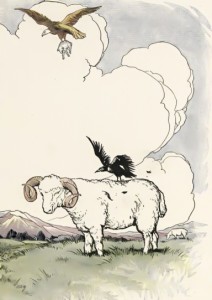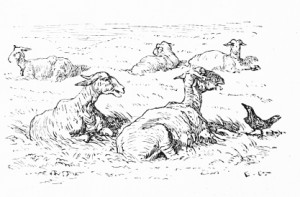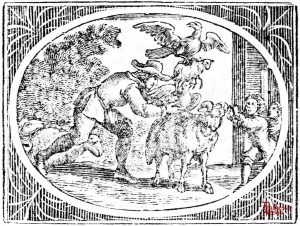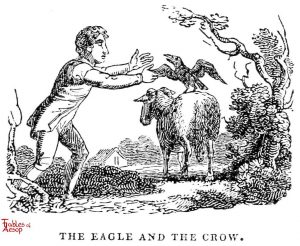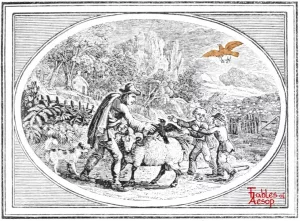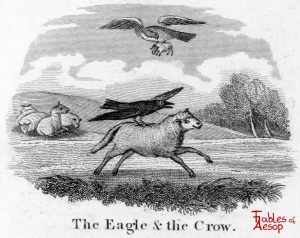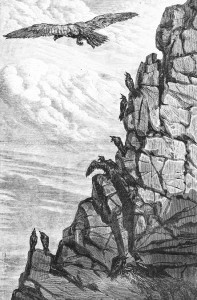A Daw saw an eagle carry off a sheep and tried the same trick. The daw could not do it and got caught. Ouch.
Don’t take on more than you can accomplish.

Aesop For Children (The Eagle and The Jackdaw)
An Eagle, swooping down on powerful wings, seized a lamb in her talons and made off with it to her nest. A Jackdaw saw the deed, and his silly head was filled with the idea that he was big and strong enough to do as the Eagle had done. So with much rustling of feathers and a fierce air, he came down swiftly on the back of a large Ram. But when he tried to rise again he found that he could not get away, for his claws were tangled in the wool. And so far was he from carrying away the Ram, that the Ram hardly noticed he was there.
The Shepherd saw the fluttering Jackdaw and at once guessed what had happened. Running up, he caught the bird and clipped its wings. That evening he gave the Jackdaw to his children.
“What a funny bird this is!” they said laughing, “what do you call it, father?”
“That is a Jackdaw, my children. But if you should ask him, he would say he is an Eagle.”
Moral
Do not let your vanity make you overestimate your powers.

Townsend version
An eagle, flying down from his perch on a lofty rock, seized upon a lamb and carried him aloft in his talons. A Jackdaw, who witnessed the capture of the lamb, was stirred with envy and determined to emulate the strength and flight of the Eagle. He flew around with a great whir of his wings and settled upon a large ram, with the intention of carrying him off, but his claws became entangled in the ram’s fleece and he was not able to release himself, although he fluttered with his feathers as much as he could. The shepherd, seeing what had happened, ran up and caught him. He at once clipped the Jackdaw’s wings, and taking him home at night, gave him to his children. On their saying, “Father, what kind of bird is it?’ he replied, “To my certain knowledge he is a Daw; but he would like you to think an Eagle.”

Samuel Croxall (The Eagle and the Crow)
AN Eagle flew down from the top of a high rock, and settled upon the back of a lamb; and then instantly flying up into the air again, bore his bleating prize aloft in his pounces. A Crow who sat upon an elm, and beheld his exploit, resolved to imitate it; so flying down upon the back of a Ram, and entangling his claws in the wool, he fell a chattering and attempting to fly; by which means he drew the observation of the shepherd upon him, who finding his feet hampered in the fleece of the ram, easily took him, and gave him to his boys for their sport and diversion.
THE APPLICATION
Every quality which is excellent and commendable, is not, however, always a proper object for our imitation. We ought to state our own account honestly and fairly, that we may see what our abilities are, and how our circumstances stand: otherwise, we may not only become ridiculous to others, but prejudicial to ourselves, by some awkward and ill-judged emulation; though it happen, to be in a qualification truly laudable and great. It behoves every man to exert a good share of industry towards the advancement of his interest, or, if he pleases, of his reputation. But then it is highly necessary that he does this with a true regard to his own capacity, and without any danger of exposing or embarrassing himself in the operation.

Thomas Bewick (The Eagle and The Crow)
An Eagle flew down from the top of a high rock, and making a stoop at a Lamb, seized it with her strong talons, and bore aloft her bleating prize to her young. A Crow observing what passed, was ambitious of performing the same exploit, and darted down upon a Ram; but instead of being able to carry it up into the air, she found she had got her claws entangled in its fleece, and could neither move herself nor her fancied prize. Thus fixed, she was soon taken by the Shepherd, and given away to some boys, who eagerly enquired what bird it was? An hour ago, said he, she fancied herself an Eagle; however I suppose she is by this time convinced that she is but a Crow.
APPLICATION.
It is impossible for any man to take a true measure of the abilities of another, without an exact knowledge and true judgment of his own; a false estimate of which always exposes him to ridicule, and sometimes to danger. Every man ought therefore to examine the strength of his own mind with attention and impartiality, and not fondly to flatter himself that he can by an awkward and ill-judged emulation soar to the height which has been attained by men endowed by nature with great abilities and original talents, matured by industry. We can no more adopt the genius of another man, than we can assume his shape and person. The bright original in every department of the arts and sciences will be valued and esteemed, whilst his puny imitators will be treated with neglect, or be despised. Almost every man has something original in himself, which, if duly cultivated, might perhaps procure him respect and applause, and it is creditable for him to endeavour justly to obtain them.
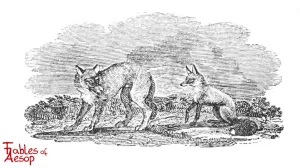

Jefferys Taylor
AN eagle descending one day from the skies,
Seized a lamb in his talons, and made him his prize:
Then spreading his pinions abroad to the gale,
Bore his prey through the air with a dignified sail.
“That was very well done,” thought a crow, “I confess;
Yet I can perform it still better, I guess:”
So saying, she dropt on the back of a lamb,
But “alas!” thought the crow, “what a blockhead I am!”
For her feet were entangled so fast in the fleece,
That she neither could rise nor obtain her release;
So instead of her taking the lamb, you must know,
The lamb with great ease ran away with. the crow.
When little folks try with the great to compare,
They soon show their neighbours how little they are.

JBR Collection
A Crow watched an Eagle swoop with a majestic air from a neighbouring cliff upon a flock of Sheep, and carry away a Lamb in his talons. The whole thing looked so graceful and so easy withal, that the Crow at once proceeded to imitate it, and pouncing upon the back of the largest and fattest Ram he could see, he tried to make off with it. He found not only that be could not move the Ram, but that his claws got so entangled in the animal’s fleece, that he could not get away himself. He therefore became an easy prey to the Shepherd, who, coming up at the time, caught him, cut his wings, and gave him to his children for a plaything.

L’Estrange version
An eagle made a stoop at a lamb; truss‘d it, and took it cleverly away with her. A mimical daw, that saw this exploit, would needs try the same experiment upon a ram: but his claws were so shackled in the fleece with lugging to get him up, that the shepherd came in, and caught him, before he could cleare himself; he clipt his wings, and carry’d him home to his children to play withal. They came gaping about him, and ask’d their father what strange bird that was? Why, says he, he’ll tell you himself that he’s an eagle; but if you’ll take my word for’t; I know him to be a daw.
Moral
‘Tis a high degree of vanity and folly, for men to take more upon them then they are able to go thorough withall; and the end of those undertakings is only mockery and disappointment in the conclusion.

Crane Poetry Visual
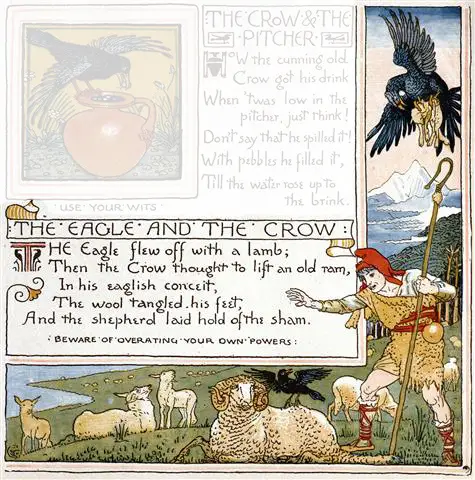
The Eagle flew off with a lamb;
Then the Crow thought to lift an old ram,
In his eaglish conceit,
The wool tangled his feet,
And the shepherd laid hold of the sham.
Beware of overating [sic] your own powers.

Corvus Aquilam Imitans
Aquila, celsa de rupe devolans, agnum e grege eripuit. Quod cum corvus videt, aemulatione movetur. Vehementi strepitu, in arietem irruit atque ungues in vellere ita implicat ut se iam motu alarum nequeat explicare. Hunc pastor videns, prehendit; pennis alarum succisis, pueris praebet ludibrio. Ingemens, corvus secum ait, “Hei mihi! Prius, aquilam me esse putavi; nunc vero, me corvum esse cognosco.”
Perry #002
